Mozambique seeks joint efforts with Tanzania in border control - Watch
RENAMO dissatisfied with slowness of peace talks in Mozambique
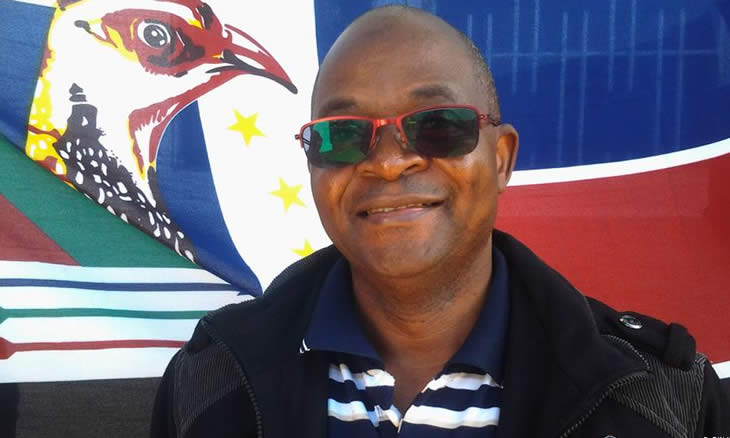
in file CoM
At a press conference in Maputo, Renamo has expressed dissatisfaction with the slowness of the peace negotiations and accuses Frelimo of employing “Machiavellian manoeuvres” in the matter of who is to govern the Mozambican city of Quelimane.
Renamo noted on Tuesday that it was still waiting for the number of officers foreseen in the agreement to join the army.
“The negotiating process is moving very slowly,” Renamo spokesman José Manteigas said.
In December, the Mozambican government temporarily appointed three senior Renamo officers to positions in the Mozambican army under the Memorandum of Understanding signed between the parties in August.
Three officers appointed instead of 14
But Renamo complains that the memorandum does not provide for interim appointments, and that only three officials have been appointed instead of the 14 envisaged in the memorandum.
“These appointments are against the spirit and the letter of the agreement, but Renamo is still at the negotiating table and we will do everything possible to bring the process to a successful conclusion,” Manteigas said.
The document, signed by the Mozambican head of state, Filipe Nyusi, and the new president of Renamo, Ossufo Momade, distributes several military posts between Renamo and the government and, at the level of the General Staff of the Armed Forces, provides that, of a total of nine departments, three are to be handed over to opposition party officers.
The memorandum also states that, out of a total of 12 Army departments, four will be delivered to Renamo, as well as seven positions in independent brigades and battalions – bringing to 14 the number of Renamo officers to be assigned to the FADM.
Negotiation process with little more than 1 year
The same document also foresees the placement of other “10 officers to positions of direction and command in the Police of the Republic of Mozambique (PRM)”, but only after an “understanding regarding their placement in the Ministry of the Interior”.
Officially, the current negotiating process between the ruling Frelimo government and Renamo started just over a year ago when Filipe Nyusi went to Gorongosa in central Mozambique to meet the late Renamo leader Afonso Dhlakama, who died of ill-health on May 3 last year.
In addition to the disarmament and integration of the men of the armed wing of the main opposition party in the Armed Forces, the negotiating agenda between the two sides involved measures decentralising power, a matter accomplished by the revision of the Constitution in July.
“Machiavellian Maneuvers”
At the press conference on Tuesday, Renamo also accused Frelimo of manoeuvring in attempts to govern Quelimane, and condemning the decision to remove Manuel de Araújo from the position of president of the municipality is a “hard blow to democracy”.
“The regime continues to manoeuvre to counter the will of Quelimane residents, fighting in a Machiavellian manner to obtain via the secretariat what they lost via popular vote,” Manteigas.
At issue is the decision of the Mozambican Council of Ministers to remove Manuel de Araújo from office, for having decided to run for a new mandate as leaders of the city for Renamo while still performing the same functions after being elected under the banner of the Democratic Movement of Mozambique (MDM), Mozambique’s third largest political party.
The governor of Quelimane, in the province of Zambézia, appealed the decision to the Administrative Court on the grounds that he was not given the opportunity to defend himself in the process and that the wrong law was applied to the case, but appeal was denied in a ruling published on 11 January, with only a few weeks to the end of the term.
“Strategies of the party in power”
For Renamo, the decision of the Administrative Court and the position of the Ministry of State Administration result from Frelimo’s “party strategies in power”, intended to distract the people.
“It is a staging and an attempt to distract Mozambicans from the international judgements of corrupt Frelimo members involved in hidden debts,” Manteigas added, referring to the new developments in a US investigation that reveals bribes and other illegalities in the contracting of loans for three public enterprises totalling about 2 billion US dollars.
Manteigas said that Manuel de Araújo, who returned to run and win in Quelimane in the October 10 municipal elections, will take office in the new term.
“Manuel de Araújo will take office in February, in compliance with the ruling of November 13, 2018 of the Constitutional Council, a document that validates and proclaims his election to the post,” noted the spokesman, who reminds that decisions of the Constitutional Council are mandatory.
When will de Araújo take office?
The ruling of the Administrative Court that rejected the appeal does not mention the effects on the new mandate that Manuel de Araújo won with the victory in the municipal elections of October 10 of last year, since the appeal was about the mandate that the mayor was fulfilling since 2014.
In this sense, it is still not legally clear whether Manuel de Araújo is qualified to take office for a new term due to the victory in the last municipal elections or if the ruling of the Administrative Court released on January 11 prevents this act.


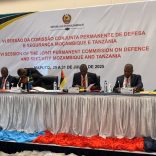
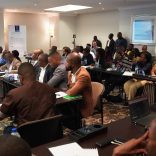
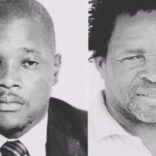
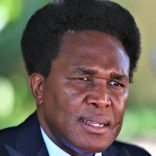
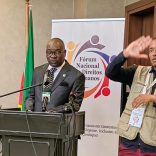
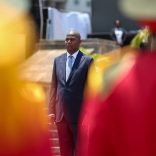




Leave a Reply
Be the First to Comment!
You must be logged in to post a comment.
You must be logged in to post a comment.